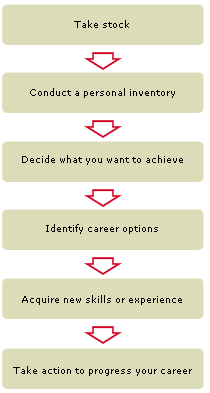Maximizing Efficiency


Work overload is a
common source of workplace stress. You can take steps to deal with it by
being ruthless in your use of time, accurately identifying your
priorities, eliminating as many low value activities as possible, and
delegating properly. Try also to eliminate uncertainty about your job
and clarify your career path.
Take Control of Your Career
In the many jobs that lack established career paths,
you may be the only person looking after your long-term prospects. There
are several ways to avoid the stress that comes from an uncertain or
stalled career future.
Avoid Stagnation
In young, fast-growing
organizations, the absence of career paths is often not a problem. If
you’re flexible and good at what you do, opportunities will arise often,
and you just need to be alert and take advantage of them. However, in
more mature organizations, a lack of obvious career paths can be
worrying, especially early in your career, when you need to be gaining
plenty of experience as quickly as you can to qualify for better and
more challenging jobs. In other organizations, it’s possible to become
too valuable in your job to be allowed to move forward in your career,
and this, too, can be intensely frustrating.

Take Charge of Your Career Planning
If, after conducting
the job analysis and talking it through with your manager, you still do
not have an obvious career path open to you, you will need to take
charge of your own career planning. Keep your eyes open for
opportunities that present themselves.
Plan Your Career Future
You need to take stock of where you are now, look at
the opportunities open to you, and plan how to take advantage of those
opportunities.
Look at your current position – Conduct a personal inventory of your knowledge, skills, experience, and resources.
Think about your goals – Decide what you want to achieve with your life and your career. Look at all the possibilities.
Research your options
– You need to know whether the career has a future, what the
requirements are to move to the next stage, and how well you will be
paid as you progress.
Plan your approach – Decide what you want to achieve. If you need new skills or experience, acquire them.
Take action!
– If you decide to manage your career within your current organization,
start taking the necessary actions to progress your career. If you
decide that you need to change organization in order to progress your
career, then set about finding the best possible alternative job that
you can.
Talk to people already doing the job to find out what you need to know and do to progress.
